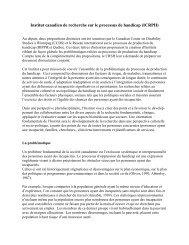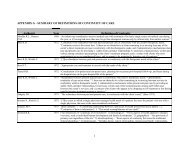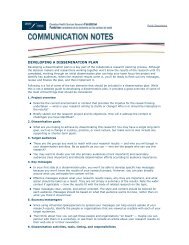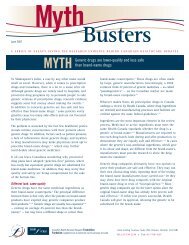Full Report
Full Report
Full Report
Create successful ePaper yourself
Turn your PDF publications into a flip-book with our unique Google optimized e-Paper software.
Overcoming challenges<br />
The mental health pilots faced a number of challenges.<br />
Initially, a number of staff resisted the project, possibly<br />
mistaking change as a condemnation of current practice<br />
rather than an opportunity to improve. 113 Nonetheless,<br />
the pilot team did gain the support of staff at the pilot<br />
sites through training and directly involving them in<br />
development of the new referral pathways. Staff noted<br />
that the divide between inpatient and outpatient<br />
services had become less adversarial. One interviewed<br />
observed that “there is common ground now – a lot<br />
more understanding.”<br />
Staff highlight issues related to clients’<br />
consent to share their medical information.<br />
The question of consent<br />
Although the new pathways were seen as a useful<br />
tool for standardization and information sharing, staff<br />
highlighted issues related to clients’ consent to share<br />
their medical information. Staff expressed concerns<br />
not only about the ethical issues related to obtaining<br />
consent from clients in crisis situations, but also about<br />
the validity of such consent. 114 Staff also expressed<br />
confusion about who should be expected to obtain<br />
client consent and what information could be shared<br />
among different groups. 115 This uncertainty hampered<br />
communication as providers perceived they were<br />
unable to legally distribute information within<br />
NWT. Some sites sought legal advice about current<br />
legislation and practices, and some staff refused to<br />
share certain information. 116 If NWT is to realize the<br />
full benefit of the new pathways, guidelines would<br />
provide clarity about the legality, practice and process<br />
for obtaining client consent. 117<br />
Forging departmental leadership<br />
Staff at the IP level generally considered project<br />
leadership to be strong. Despite having a change in<br />
department-level leadership for the mental health<br />
project, pilot staff saw their leads as an accessible<br />
resource when addressing challenges and barriers<br />
associated with their IP.<br />
Making the Case for Change<br />
50














